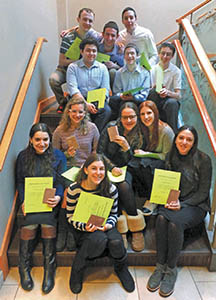
Editor’s Note: This essay was written and delivered at the JYEP Hebrew School Annual Scholarship Breakfast this past Sunday by Zachary Orenshein, one of the senior honorees. For more information about the JYEP, please contact Dr. Debby Rapps, director, at 201-833-JYEP, or visit online at www.jyep.org.
Two years ago, I began tutoring a boy who was in third grade at the JYEP Hebrew School in Teaneck. This student is currently growing up in an observant home, but attends public school because, while he is very smart, his unique social and education needs are not met by yeshiva day school classrooms. As a result, when I began working with him, his Hebrew vocabulary was limited to words we use colloquially, like shalom and Torah and, but did not yet include words taught in school such as ani or bayit. He also lacked a basic knowledge of the stories of our illustrious heritage that are retaught in yeshivos every year in their season. As I set out to close the gap between him and his yeshiva day school peers through our weekly sessions, he quickly reminded me that he is not your average student. He would not stand for the typical strategy of learn, review, learn, review. He needed me not to teach, but to teach him. He needed that because, for most people, King Solomon’s mantra of “Chanoch l’na’ar al pi darko” is an ideal, but for him it is a necessity. Once I realized this, I began trying different strategies to teach him in ways that he could learn. This led to many of our sessions taking place with my student lying down across chairs while telling me the difference between sho-el and omer and. Often I found that we could learn much better if we first had a more relaxed conversation or a change in location. Every week he improved his Hebrew and learned more about Judaism, and I came out every week with a greater sensitivity to his style of learning.
Every tutor has a folder with a new form to fill out every week regarding how our sessions went. To this day, two years after starting with my student, it is still common for me to leave our session and record a new strategy that I used to help him be more receptive to learning. Through all our hard work together, at this point, my student is, thank God, on track to finish our Hebrew workbook by the end of the year and already has a much better Hebrew vocabulary and understanding of vital concepts like discerning the shoresh (root) of a word.
There are two types of moments, though, that I think are most important in our learning together. The first was epitomized by our first session this year when I went through all the words in the book that we learned in our sessions before the three months of summer break. Having not known around 97 percent of them prior to his tenure in the JYEP, I expected him to remember about 3 percent and then to remind him of about 70 percent relatively quickly. After I reviewed with him all the words, he ended up correctly translating, I’d say, at least 80 percent of them. While his style of learning may be unconventional, he is not studying words and forgetting them, but gradually building a Hebrew vocabulary in his long-term memory.
The second type of moment is when we transition away from our frequent conversations about various random topics to something meaningful. For example, he often digresses and talks about soccer, which then leads to discussing the World Cup, and then on to how Israel made the World Cup one year, and then how Israel is so small. But then we’ll discuss why Israel is important and then why Judaism is important and then maybe how we can have a relationship with God. While this does not happen too often, each time it does I believe it is very important, as even though he comes from an observant home, these important discussions don’t take place in his public school.
I believe these conversations have such a great impact and are a lot more meaningful when they come up organically, which is possible in the one-on-one setting in the JYEP. Our journey together is not yet over but, even up until now, through JYEP we have both learned a lot and have grown tremendously along the way.
By Zachary Orenshein








